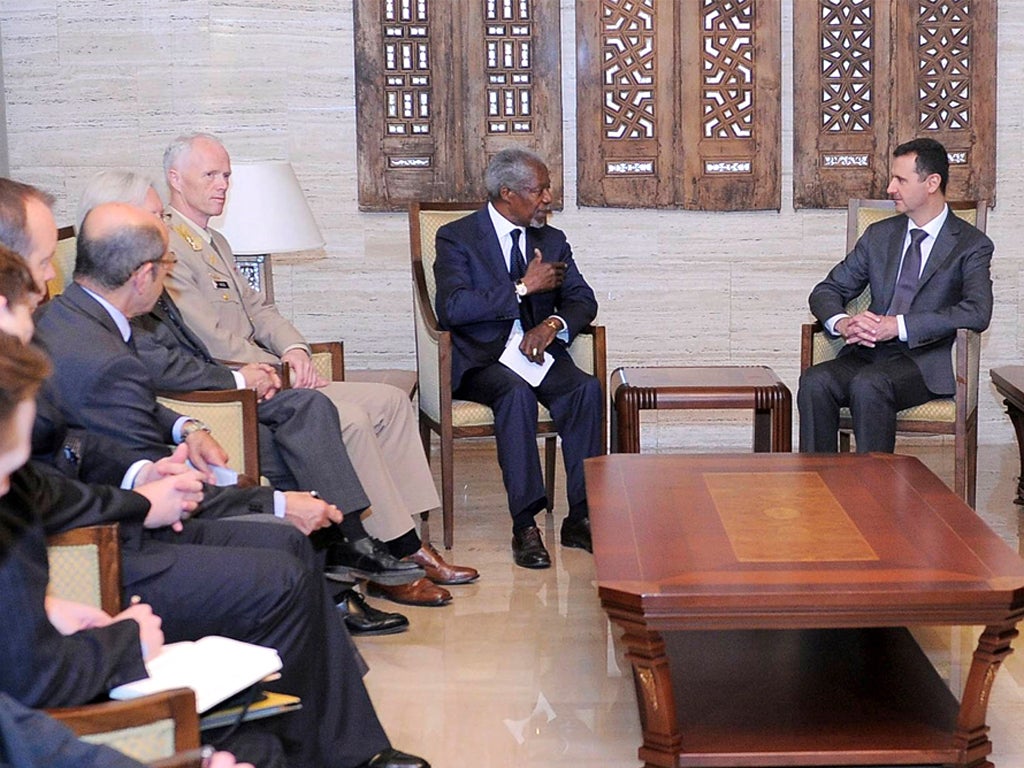Syria isolated as Western capitals expel diplomats
Europe and US ratchet up diplomatic pressure on Assad's pariah state

Bashar al-Assad's regime was facing increasing isolation yesterday with nearly a dozen Western states expelling Syrian envoys in retaliation for the Houla massacre, and with renewed calls for the United Nations to impose far-reaching sanctions.
In a day of intense diplomatic activity, 11 countries including Britain and the United States threw out senior embassy staff. The co-ordinated moves came as the UN representative, Kofi Annan, met President Assad in Damascus in an attempt to rescue what was left of his peace plan and stress the "grave concern of the international community" at the violence, which shows no signs of abating. "We are at a tipping point," Mr Annan said after a meeting Assad yesterday. "The Syrian people do not want the future to be one of bloodshed and division. Yet the killings continue and the abuses are still with us today."
President Assad, however, reiterated his claim that the killing of 108 civilians in Houla on Friday was the work of "terrorists". Armed gangs had stepped up bombings and shootings as well as carrying out abductions while his own forces were exercising restraint, he insisted. Regime officials maintained that the outside world was being subjected to a propaganda offensive in tandem with the insurgent offensive in Syria.
Overall there appears to be a growing feeling that Mr Annan's six-point plan to end the strife was failing and the deaths of more than 100 civilians, including women and children, in the Houla region may become the catalyst for more direct action against the Syrian regime by the countries supporting the opposition.
By yesterday evening, Britain, the US, France, Germany, Italy, Spain, Australia, Canada, the Netherlands, Bulgaria and Switzerland had all announced the expulsion of Syrian diplomats, with pledges that other measures would follow.
France was first to take diplomatic action, asking the Syrian ambassador Lamia Shakkour to leave within 48 hours. "Bashar al-Assad is the murderer of his people," said France's Foreign Minister Laurent Fabius. "He must relinquish power. The sooner the better." President François Hollande said he held discussions with David Cameron and the UN Secretary General Ban Ki-moon before announcing the step as part "of a certain number of pressure tactics".
The US administration gave Syrian chargé d'affaires, Zuheir Jabbor, three days to leave the country. The State Department spokeswoman Victoria Nuland said of the Houla attack: "We hold the Syrian government responsible for this slaughter of innocent lives."
In London, William Hague stated that the chargé d'affaires, Ghassan Dalla, and two other diplomats had been told to leave the country within seven days as "an expression of horror" at the actions of the regime. Mr Dalla confirmed the news. It is believed a small caretaker staff will remain in London.
One nation in which Syrian diplomats remain firmly entrenched, however, is Russia, which has proved to be Assad's firmest ally during the 14-month crisis. Mr Hague visited the country on Monday, but failed to persuade Moscow to support stronger action against Syria through the UN. Mr Hague acknowledged that Russia "had a different attitude to the Assad regime" but said Western nations would continue to urge Moscow to use its leverage with Assad.
In Germany, the Foreign Minister, Guido Westerwelle, said his government would push for the UN Security Council to consider further sanctions against the regime. "They bear responsibility for the terrible events in Houla," he said. "Those who use heavy weapons against their own people must expect serious diplomatic and political consequences."
Most of Houla victims shot at close range
Most of the 108 victims of the Houla massacre were executed at point-blank range in their homes and fewer than 20 were killed by shellfire, the UN human rights office said yesterday.
Survivors say that the slaughter of the villagers, 83 of whom were women and children, was carried out by a pro-government militia from nearby Alawite villages called the Shabiha who went house-to-house on a killing spree after an artillery bombardment.
Rupert Colville, a spokesman for the UN Human Rights Commissioner, said UN ceasefire monitors found fewer than 20 of the dead were killed by artillery fire. The rest appeared to have been shot at close range.
Witnesses told Human Rights Watch that at noon on 25 May anti-government protesters gathered in Taldou. They were shot at by soldiers at a checkpoint. Armed militants attacked the checkpoint, provoking shelling of Houla by tanks and mortars. At about 6.30pm, gunmen attacked houses near Houla dam and killed people belonging to an extended family.
Patrick Cockburn
Join our commenting forum
Join thought-provoking conversations, follow other Independent readers and see their replies
Comments